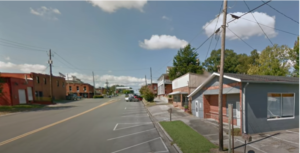Roswell, Georgia is a historic city in the northern part of Fulton County. Founded in 1836 by Roswell King, the city was named after him. King, a businessman from coastal Georgia, saw the potential of the area due to its proximity to the Chattahoochee River and its power to drive mills. He purchased land in the area and began to develop it into a manufacturing center. His cotton mill, completed in 1839, was one of the largest in Georgia at the time.
In addition to the cotton mill, King developed other industries in Roswell, including a woolen mill and a tannery. The city quickly became a hub of commerce in the region, and by the 1850s, it was one of the largest manufacturing centers in Georgia.
Roswell played a significant role in the Civil War. The city was captured by Union forces in July 1864 and occupied for several months. The Roswell Mill, which had been producing clothing for the Confederate army, was burned by Union troops in an effort to disrupt the South’s war effort.
Following the war, Roswell slowly rebuilt its manufacturing industry. The cotton mill was rebuilt and continued to operate until the 1970s. During this time, the city also developed a thriving agricultural industry, with farmers growing cotton, peaches, and other crops in the surrounding area.
In the early 20th century, Roswell began to shift away from its manufacturing and agricultural roots and became a suburban community. In the 1950s and 1960s, the city experienced rapid growth as Atlanta’s metropolitan area expanded. Today, Roswell is a thriving city with a population of over 94,000.
Roswell has preserved much of its historic architecture and charm, and the city’s historic district is a popular destination for visitors. The district is home to many of Roswell’s original buildings, including antebellum homes, historic churches, and the Roswell Mill. Visitors can take a walking tour of the district to learn more about the city’s history and architecture.
In addition to its historic district, Roswell is known for its parks and natural beauty. The city has over 900 acres of parkland, including the Chattahoochee River National Recreation Area, which offers opportunities for hiking, fishing, and kayaking.
Roswell is also home to several museums and cultural attractions. The Roswell Cultural Arts Center hosts a variety of performances and events throughout the year, and the Southern Trilogy Historic House Museums offer a glimpse into life in antebellum Georgia.
In the late 1800s, Roswell experienced significant growth and development thanks to the introduction of the railroad. The city became a hub for the cotton trade, with several cotton mills and factories operating in the area. By the early 1900s, Roswell had established itself as a prosperous industrial center, and many new businesses and residential neighborhoods were built.
During the mid-1900s, Roswell underwent a period of transition, as many of its industries and businesses began to decline. However, in the 1960s and 1970s, the city began to experience a resurgence, thanks in part to the growth of nearby Atlanta. Many new businesses and residential developments were built, and the city once again became a thriving center of commerce and culture.
History is Preserved Here
Today, Roswell is known for its historic architecture, beautiful parks, and vibrant cultural scene. Visitors to the city can explore its many museums and historic sites, including the Roswell Mill, Bulloch Hall, and Barrington Hall. They can also enjoy a wide range of recreational activities, including hiking, fishing, and boating at local parks like Chattahoochee River National Recreation Area and Roswell Area Park.
Roswell takes great pride in preserving its historical sites and structures, and visitors can find many places throughout the city that showcase the town’s rich history. Some of the most notable historic landmarks in Roswell include:
Bulloch Hall: Built in 1839, this Greek Revival mansion was home to Mittie Bulloch, the mother of President Theodore Roosevelt. Today, the home is open to the public and offers tours, exhibits, and special events.
Roswell Mill: This historic mill complex was built in the 1830s and played a major role in the town’s economy during the Civil War. Today, visitors can explore the ruins of the mill and learn about its history at the nearby Roswell Mill Ruins Park.
Smith Plantation: This antebellum plantation home was built in 1845 and offers a glimpse into life in the pre-Civil War South. Visitors can tour the home and see original furnishings and artifacts from the period.
Archibald Smith House: This restored Greek Revival home was built in 1845 and was the home of Roswell’s founding family. Visitors can tour the home and learn about its history as well as the history of the town.
In addition to these historic landmarks, Roswell also has a number of other museums and cultural centers that offer insights into the town’s past. These include the Roswell Historical Society Museum, the Chattahoochee Nature Center, and the Southern Trilogy Historic House Museums.
Overall, Roswell’s commitment to preserving its history makes it a fascinating and educational destination for anyone interested in the rich heritage of the American South.
Roswell, Georgia offers visitors a unique opportunity to step back in time and explore the rich history of the area. With its well-preserved historic homes and museums, visitors can get a sense of what life was like during the 19th and early 20th centuries. For those interested in the Civil War, Roswell is home to several historic sites and landmarks, including the Roswell Mill and the Old Mill Park.
Whether you are a history buff or simply interested in learning more about the past, a visit to Roswell is a must-do for anyone looking to explore the fascinating history of Georgia. Roswell has a rich and fascinating history that spans more than 150 years. From its early days as a small cotton town to its present-day status as a thriving cultural and economic center, the city has remained a vital part of the state of Georgia, offering visitors and residents alike a unique blend of history, culture, and natural beauty.


